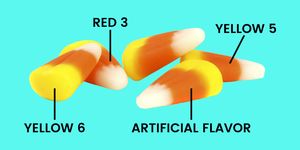
Just in time to put a major damper on Halloween, last Friday, the Food and Drug Administration nixed six synthetic flavorings found in candies, baked goods, soda, booze, and gum on the grounds that large quantities of the edibles can directly contribute to cancer in animals.
The ingredients include synthetically-derived benzophenone (which can be found in rubber reusable food containers), ethyl acrylate, eugenyl methyl ether (methyl eugenol), myrcene, pulegone, and pyridine, which aren’t specifically listed on labels because they fall under the umbrella of proprietary “artificial flavors” that manufacturers don’t have to release, according to the petition that led to the FDA’s ruling. The additives are used to contribute floral, cinnamon, mint, citrus, mango, woody, pineapple, roasted onion, and garlic flavors, according to the document—meaning sweet and savory foods and beverages could be affected, all unbeknown to customers.

The FDA’s decision is based on data gathered by the United States Department of Health and Human Services’ National Toxicology Program, which proved the ingredients caused cancer in laboratory animals.
The agency, which did not respond immediately to Cosmopolitan.com’s request for comment, didn’t provide any directives on which foods to avoid if you’ve concerned. Luckily, there’s no real reason to freak since the ingredients aren’t all that common and, even then, only found in food in small amounts, according to the FDA’s statement. “Their use results in very low levels of exposures and low risk,” the agency wrote, noting that the animals in the study were exposed to much higher doses than the average human with a sweet tooth.
The update doesn’t make foods that contain said ingredients illegal or anything; rather, it calls for manufacturers who use these additives in foods and beverages or, in the case of benzophenone, in containers, to eliminate them from all products within 24 months. In other words, there’s a chance a treat you love will get a smidge healthier in due time.
A previous version of this article stated that large quantities of the edibles can directly contribute to cancer. It has been clarified to state this has only been proven in animals.
Source: Read Full Article
